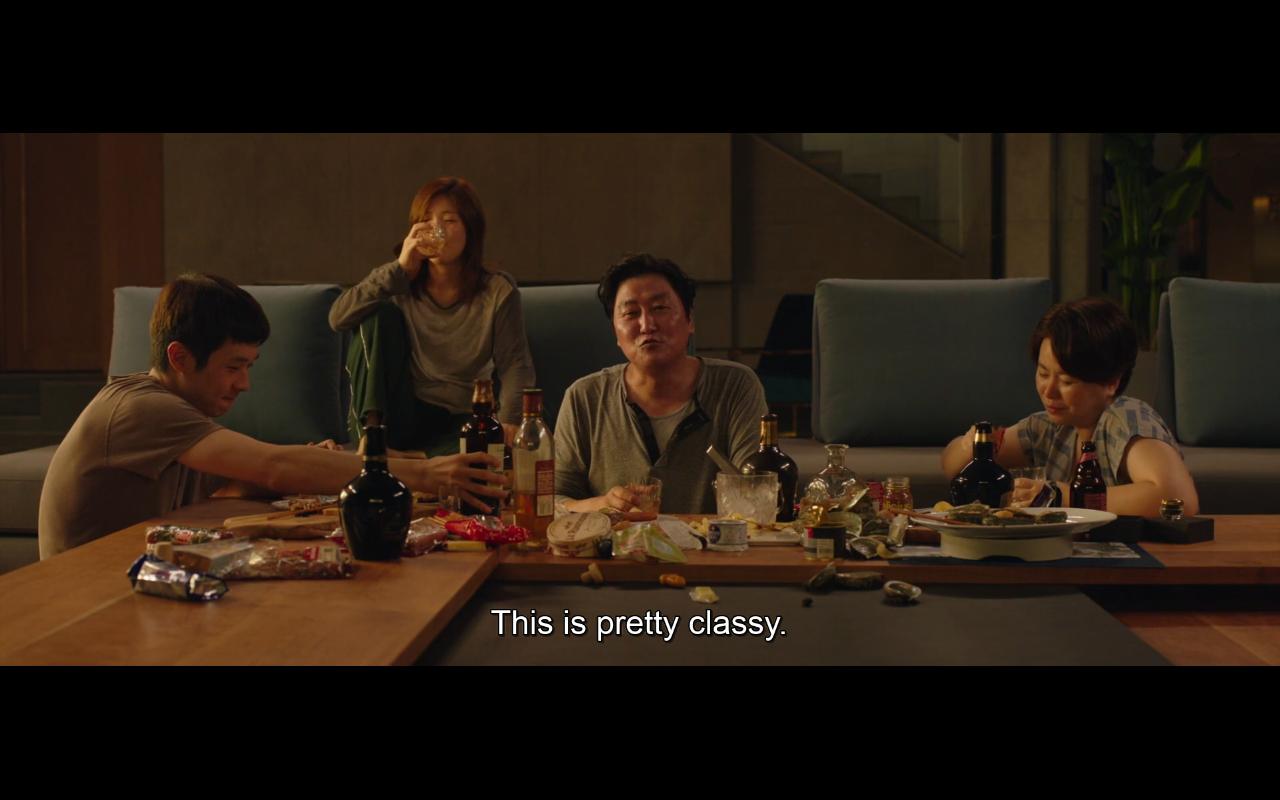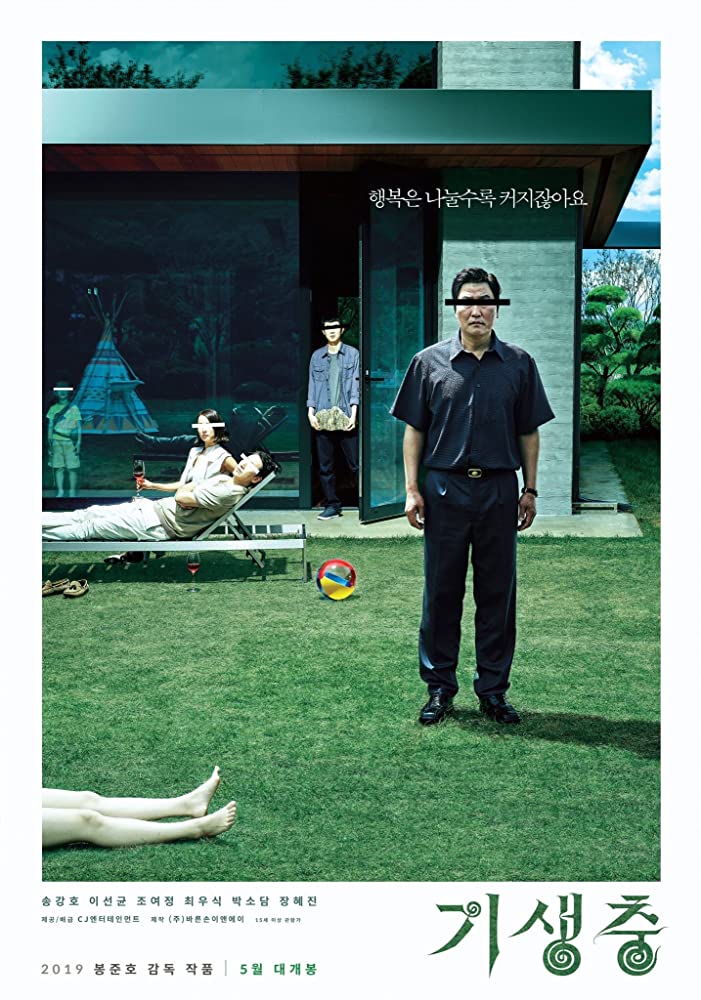Considered one of the best films in 2019, Parasite is an award-winning South Korean black comedy. Clinching numerous accolades including the Palme d’Or at the 2019 Cannes Film Festival and four awards at the 92nd Academy Awards ceremony, Parasite illustrates the distressing difference between the wealthy and the poor in a tragic comedy. As a note, it is highly recommended to watch the film prior to reading this review as Parasite is indeed a masterpiece that provides a mind-blowing experience for first-time viewers.
“A comedy without clowns, a tragedy without villains.”
Director Bong Joon-ho brings us yet another blockbuster with a perfect description regarding his film. Parasite is a story of socio-economic division, a thrilling tale of an impoverished family’s attempt to enter the lives of the wealthy.
Following the machinations of a family from the lower strata of the society, viewers are introduced to the Kims: the father Ki-taek (veteran actor Song Kang-ho), mother Chung-sook (Jang Hye-jin), the sister Ki-jung (Park So-dam) and brother Ki-woo (Choi Woo-shik). Living in a shabby semi-basement apartment that is dark and dank, the family struggles to get by on temporary odd jobs. The Kims have nothing but each other as evident in their strong relationships that play a part later on. A ray of hope shines on the destitute family when Ki-woo’s friend introduces him as his replacement English home tutor, thus intertwining their fates with the wealthy Park family.
In lurid contrast, the Park family: father Park Dong-ik (Lee Sun-kyun), mother Choi Yeon-gyo (Cho Yeo-jeong), daughter Park Da-hye (Jung Ji-so) and son Park Da-song (Jung Hyeon-jun) live a luxurious lifestyle. Complete with a chauffeur and a helper, the Parks live in a large, fanciful house overlooking a manicured lawn redolent of royalty.
Wanting to share the taste of wealth with his family, Ki-woo begins to hatch unscrupulous plans to get the Parks in dismissing their existing workers. Then, by recommending each other as highly qualified acquaintances, the Kims manage to latch themselves onto the Parks’ opulence. The scenes are entertaining albeit appalling, watching the ingenious Kims scheming to attain a post in such intricacies.

Herein, the Parks leave the house to the Kims as they embark on a camping trip, depicting their full trust. The Kims indulge themselves in a drunken revelry, basking in the opulence of the house as having never experienced such luxury before. The envy is obvious, the home invaders believe that these luxuries could be theirs. However, the former housekeeper Moon-gwang (Lee Jung-eun) appears, ending their euphoria short. Pleading to enter the basement of the large house, it is then revealed Moon-gwang has hidden her husband there for four full years. As facades begin to crack, the Kims and Moon-gwang enter an altercation after learning of each other’s deception. The Kims hurriedly trap Moon-gwang and her husband, Geun-sae (Park Myung-hoon), when the Parks return home early due to an oncoming storm. The light-hearted story has taken a dark, bloody turn.
A disparity in lives is further expounded. The heavy thunderstorm serves as nothing but an impediment to the Parks’ camping trip. The Kims, meanwhile, find their house flooded with sewer water, forcing them to seek shelter in a gymnasium. Meticulously selecting clothes from the donation pile, the Kims have to present themselves impeccably to the Parks the next day. Gritting through their plight, the Kims hold tightly onto the pretense, in hope of a better livelihood under the Parks’ employment.
Completely unaffected by the thunderstorm, the affluent Parks host a grand party for Da-song’s birthday along with their friends. A furious Geun-sae appears abruptly, escaping from the basement after Ki-woo goes to check on the imprisoned couple. It is then revealed Moon-gwang has died from the injuries inflicted by the Kims. The vengeful husband whose sense of self has already eroded from the years living in darkness, he begins to attack the Kims in a mad stupor.
A chaotic scene ensues, with Ki-taek’s patience reaching the limit as Dong-ik shows no concern for the bleeding Ki-jung who serves as his son’s art therapist. Instead, the Park patriarch makes snide comments on the stench of ‘poor people’s smell’. Dong-ik’s blatant disregard and disdain for them shatters Ki-taek’s control. Drenching the lawn in further crimson, Ki-taek stabs Dong-ik fatally before escaping the scene.
Finally, the film pans towards the end in a tragedy. Ki-woo suffers from brain injury, his sister has passed away, and the Kims are convicted of fraud. Taking the place of Geun-sae, Ki-taek now lives in the basement of the Parks’ grand house, escaping from the police as a wanted murderer. Parasite then ends with Ki-woo dreaming of the day he could purchase the large house and thus reunite with his father. A pipe dream, yet Ki-woo continues to hope.
An aptly named film, Parasite is about the rich leeching off the poor’s labour while the poor attempt to survive by any underhanded means. Bong’s refusal to sentimentalise either families in a sympathetic light sets a fair line for viewers to empathise with the different characters. The families, including Moon-gwang and her husband, are all victims in their own ways.
A sensational satire, the film has a clear focus on social inequality and wealth disparity, the poor are unable to afford decent living while the rich live in innocent bliss. However, the Parks have, too, suffered a loss as tragic as the Kims, both undeservedly so as they only seek to live.
The strange turn of comedy into tragedy is a seamless transition, Parasite is indeed praise-worthy of its accolades. A remarkable plot with a flawless cast, the perfect accompaniment of Jung Jae-il’s soundtracks further amplifies each and every scene superbly from pleasure to sombre. As with Bong’s films, the thought-provoking Parasite will leave the viewers with an indelible impression long past its release date.















